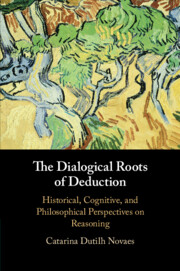 The Dialogical Roots of Deduction
The Dialogical Roots of Deduction from Part III - Deduction and Cognition
Published online by Cambridge University Press: 10 December 2020
Throughout this book, deduction has been examined and discussed from many angles and perspectives. However, one question has remained conspicuously unaddressed until now: Is deduction a correct, reliable method for reasoning? In other words, is deduction justified (Dummett, 1978)?
This investigation has focused extensively on the social conditions and factors influencing the emergence of deduction, both historically and ontogenetically. It is thus reasonable to ask whether it offers a social constructivist account of deduction, which in turn has implications for the justification problem. Indeed, on at least some versions of social constructivism, the very question of the correctness of deductive reasoning as a scientific method, understood in absolute terms, is seen as misguided.
To save this book to your Kindle, first ensure no-reply@cambridge.org is added to your Approved Personal Document E-mail List under your Personal Document Settings on the Manage Your Content and Devices page of your Amazon account. Then enter the ‘name’ part of your Kindle email address below. Find out more about saving to your Kindle.
Note you can select to save to either the @free.kindle.com or @kindle.com variations. ‘@free.kindle.com’ emails are free but can only be saved to your device when it is connected to wi-fi. ‘@kindle.com’ emails can be delivered even when you are not connected to wi-fi, but note that service fees apply.
Find out more about the Kindle Personal Document Service.
To save content items to your account, please confirm that you agree to abide by our usage policies. If this is the first time you use this feature, you will be asked to authorise Cambridge Core to connect with your account. Find out more about saving content to Dropbox.
To save content items to your account, please confirm that you agree to abide by our usage policies. If this is the first time you use this feature, you will be asked to authorise Cambridge Core to connect with your account. Find out more about saving content to Google Drive.